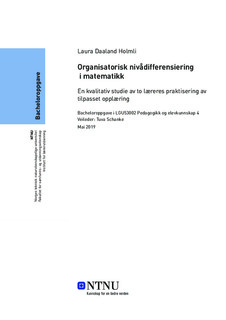Organisatorisk nivådifferensiering i matematikk
| dc.contributor.advisor | Schanke, Tuva | |
| dc.contributor.advisor | Svinvik, Solveig | |
| dc.contributor.author | Holmli, Laura Daaland | |
| dc.date.accessioned | 2019-08-23T14:06:52Z | |
| dc.date.available | 2019-08-23T14:06:52Z | |
| dc.date.issued | 2019 | |
| dc.identifier.uri | http://hdl.handle.net/11250/2610228 | |
| dc.description.abstract | Denne bacheloroppgaven undersøker hvorfor to lærere velger å bruke organisatorisk nivådifferensiering som metode for tilpasset opplæring i matematikk. Gjennom kvalitative intervju og observasjoner undersøker jeg på hvilket grunnlag lærerne innførte ordningen i første omgang og hvorfor de velger å fortsette med denne organiseringen av undervisningen. Studien er en casestudie bestående av to lærere som informanter og fire økter observasjon fra samlet og delt undervisning i klassen jeg undersøkte. Min problemstilling er: Hvorfor velger disse lærerne organisatorisk nivådifferensiering som metode for tilpasset opplæring? I teoridelen har jeg valg å ta utgangspunkt i litteratur som belyser ulike vinklinger av tilpasset opplæring: Smal og vid forståelse i tillegg til pedagogisk og organisatorisk differensiering. I tillegg har jeg lagt vekt på teori om inkludering, læringsmiljø, motivasjon og mestring, som grunnlag for analyse og diskusjonsdelen. Dette for å drøfte lærernes valg om å gjennomføre organisatorisk nivådifferensiering og virkningen av denne ordningen. Resultatene fra min studie viser tre hovedgrunner til hvorfor disse lærerne velger å gjennomføre organisatorisk nivådifferensiering. For det første; lærernes tanker rundt og syn på tilpasset opplæring. For det andre; tydelige tegn på trygghet blant elevene og ønske om å fremme mestring og motivasjon. Og for det tredje; styrket klassefølelse for enkeltelever og et grunnleggende godt klassemiljø som forutsetning for at ordningen skal fungere. | |
| dc.description.abstract | This bachelor thesis examines why two teachers choose to use organizational level differentiation to achieve customized education in mathematics. Through qualitative interviews and observations, I examine why the teachers implemented this system in the first place, and why they choose to keep holding on to this organizing of the teaching. The study is a case study consisting two teachers as informants and four lessons of observing the class I examined both gathered and divided into level groups. The main research question is: Why do these teachers choose organizational level differentiation as a method for customized education? In the theory part will be based om literature which highlights customized education from different point of perspectives: narrow and wide understanding as well as pedagogical and organizational differentiation. In addition, I will emphasize theory on inclusion, teaching environment, motivation and coping, this as a basis for the analysis. I will discuss the teacher’s choice to implement organizational level differentiation and the effects of this system. My study shows three main finds on why the teachers choose to conduct organizational level differentiation: firstly, the teachers view on and thoughts on customized education. Secondly, clear signs on safety among the students and a desire to facilitate motivation. And thirdly, a stronger feeling of being included for some of the students and good relationships between the students as a requirement for this organizing to have an effect. | |
| dc.language | nob | |
| dc.publisher | NTNU | |
| dc.title | Organisatorisk nivådifferensiering i matematikk | |
| dc.type | Bachelor thesis |
Files in this item
This item appears in the following Collection(s)
-
Institutt for lærerutdanning [3705]
